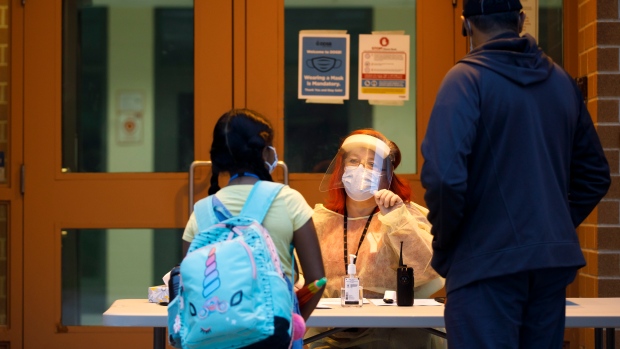Keep children home and get tested even if it’s a runny nose: new Toronto and Peel guidance – CP24 Toronto’s Breaking News

Parents must now keep their child home from school and seek a COVID-19 test if they’re showing even one new symptom in common with COVID-19, officials in Peel and Toronto say, breaking with provincial guidance that said kids with runny noses or headaches could return to school when symptoms improved.
Under the new guidance which takes effect on Dec. 7, parents must keep any child home if they are showing new or worsening symptoms including a runny nose, headache, nausea or sore throat, and also must keep home any siblings that live with them, even if they are not showing symptoms.
They must also arrange for a healthcare appointment or COVID-19 testing for the symptomatic child and parents must also stay home if they show any symptoms consistent with novel coronavirus infection.
Previously, Toronto Public Health and the province said children with one symptom including runny nose, headache, nausea or sore throat could stay home for at least 24 hours and return to school once that symptom improved, without seeking a COVID-19 test.
“Now what we’re saying is that even if it’s improved, get tested, and if it’s negative, then come back to school,” Toronto’s Associate Chief Medical Officer of Health Dr. Vinita Dubey told CP24.
Dubey stressed that the guidance is for new or worsening symptoms and not a runny nose if a child is prone to a runny nose for a prolonged period, say during winter months.
Other symptoms, such as fever above 37.8C, loss of taste or smell, cough or difficulty breathing always required immediate isolation at home and COVID-19 testing, even under the earlier guidance.
Showing two or more of any of the symptoms listed also required self-isolation and a call to the child’s doctor under the previous guidance.
The new guidance states that children who do not access a COVID-19 test once home with symptoms must stay home for at least 10 days before returning to school.
The new guidance also takes effect in Peel Region, where officials say they have been detecting case positivity rates among small children of 10 per cent or more.
For its part, Ontario’s Ministry of Education says its online screening tool will updated with links to the new guidances in Toronto and Peel Region.
“Our guidance provides a baseline, as endorsed by the Chief Medical Officer of Health. As has always been the case, local medical officers of health have the option to augment and enhance measures, based on their local situations and circumstances,” Education Minister Stephen Lecce’s spokesperson, Caitlin Clark, told CTV News Toronto.
Toronto Public Health says the new guidance is informed in part by recent asymptomatic COVID-19 testing and other surveillance at schools, including an elementary school in Thorncliffe Park where 26 cases were found – representing roughly one in every 25 occupants of the school building.
“A handful of them, five or more, actually had mild symptoms the week before they were tested,” Dubey said of the children at Thorncliffe Park Public School. “The symptoms resolved so they went back to school, but actually they tested positive, so it was from COVID. It’s those kinds of cases we want to prevent with this change in screening.”
Dubey said the change to the testing guidance was in the works for several weeks and not introduced as a result of the experience at Thorncliffe Park Public School.
“But what happened at Thorncliffe Park showed us why we needed to go ahead with this,” she said.
Earlier, Toronto District School Board spokesperson Ryan Bird said there are plans for voluntary asymptomatic testing at “four or five” other schools apart from Thorncliffe Park Public School.
The earlier guidance brought forward in October was made in part to ease the burden on the province’s COVID-19 assessment centres, which saw hundreds if not thousands of parents per day bring children with runny noses for testing during the first few weeks of school in September, causing a test specimen backlog that eventually reached 90,000 cases.
Published at Fri, 04 Dec 2020 17:16:00 +0000





Comments
Loading…